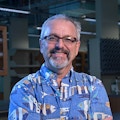David M. Karl, Ph.D.
Co-Director, SCOPEVictor and Peggy Brandstrom Pavel Professor of Microbial Oceanography
Director, Daniel K. Inouye Center for Microbial Oceanography: Research and Education Department of Oceanography, University of HawaiiDavid M. Karl’s website

SCOPE-ALOHA Project: Controls on Microbial Metabolism, Productivity and Export at Station ALOHA
Karl’s research interests revolve around energy and matter transformations ranging from solar energy capture to the major cycles of C, N, P, and S. He has developed and employed analytical techniques to study ecological and biogeochemical processes in the sea with a focus on blue water oceanography. The Hawai’i Ocean Time-series (HOT) program has revealed many previously undocumented phenomena within a temporally dynamic ecosystem that is vulnerable to climate change. Karl and his team has, over the past two decades, helped to build the basic understanding of microbial and biogeochemical processes at Station ALOHA, but much more needs to be done. For example, despite extremely low dissolved nutrient and growth co-factor (e.g., B-complex vitamins) concentrations, rates of primary production are moderate (exceeding 1 g C m-2 d-1), especially considering the very low standing stocks of chlorophyll. By contrast, net primary production (gross primary production – phytoplankton respiration) approaches zero using the standard methods of analysis. This dynamic ecosystem of producers and consumers is complex, tightly coupled, and highly regulated; yet the detailed mechanisms of energy and mass transformations are not well known or even constrained. Since the recycling is nearly quantitative in the upper 200 m of the water column, there is limited export to the dark abyss below, even though it too is populated by metabolically active microorganisms, albeit at lower concentrations and with lower per cell metabolic rates. This project seeks a better understanding of the processes that control microbial dynamics at Station ALOHA.
Bio:
David Karl is the Victor and Peggy Brandstrom Pavel Professor of Microbial Oceanography and Director of the Daniel K. Inouye Center for Microbial Oceanography: Research and Education (C-MORE) at the University of Hawai’i. In spring of 1973, Karl participated in his first oceanographic research expedition to the Cariaco Basin aboard the RV Eastward. Since that time Karl has spent more than 1,000 days conducting research at sea including 23 expeditions to Antarctica. In 1988 he co-founded the Hawai’i Ocean Time-series (HOT) program that has conducted sustained physical, biogeochemical and microbial measurements and experiments at Station ALOHA on approximately monthly intervals for the past 25 years. In 2006, he led a team of scientists in the establishment of a new NSF-supported Science and Technology Center at the University of Hawai’i. C-MORE conducts collaborative research on marine microorganisms from genomes to biomes, and has a vital training mission to help prepare the next generation of microbial oceanographers. Karl has received several awards and honors including the G. Evelyn Hutchinson Medal from the American Society for Limnology and Oceanography, the Henry Bryant Bigelow Medal from Woods Hole Oceanographic Institution, the Alexander Agassiz Medal from the U.S. National Academy of Sciences and an honorary D.Sc. degree from the University of Chicago. He is a Fellow of the American Geophysical Union and the American Academy of Microbiology, and a member of the U.S. National Academy of Sciences. For the past eight years, Karl has served as Director of C-MORE, and he will now serve as SCOPE co-Director with Dr. Edward DeLong.